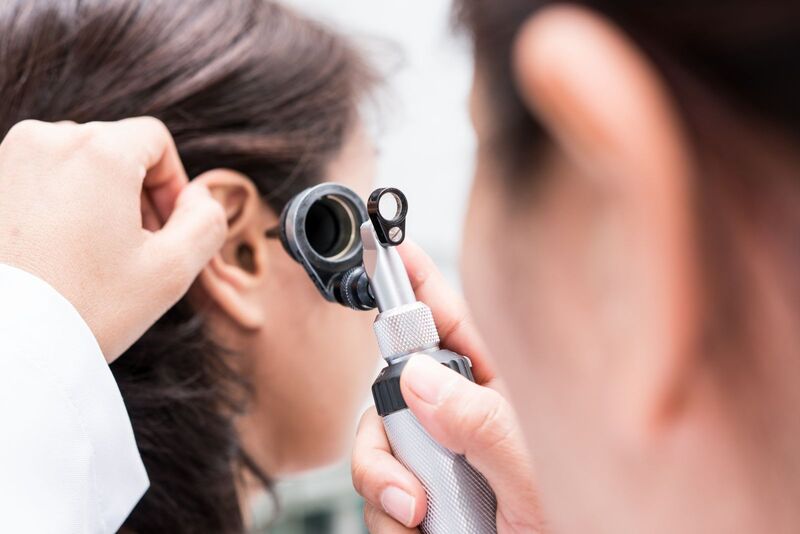1. Why did you suddenly go deaf?
Sudden deafness is described as a sudden, rapid, short-term hearing loss that can last for several minutes or hours. Rarely, sudden deafness lasts a few days. This condition usually occurs in only one ear, but there are cases of sudden deafness in both ears or alternating ears.

Sudden deafness is short-term hearing loss
Sudden deafness often occurs in cases such as:
- When the patient wakes up in the morning, it is difficult or impossible to hear any sounds.
- Sudden deafness occurs when you are trying to listen to some indistinct sound, for example when using the telephone.
- Sudden deafness when the patient encounters a sudden loud noise and at the same time hearing disappears
- This sudden deafness can be accompanied by other unpleasant symptoms such as ringing in the ears, dizziness, feeling of fullness in the ears, itching in the ears, etc. Quite a few patients encounter this condition but are subjective due to sudden deafness. only lasts a short time, then partially or completely restores hearing.
In Otolaryngology, sudden deafness is an emergency that requires prompt examination and treatment. It is caused by a problem with the sensory organs of the inner ear, which can recur and affect your hearing.

Sudden deafness may not have a cause
Sudden deafness is quite common, with an incidence of 1-6 people per 5,000 people. There are many patients who do not go to the doctor and get treatment, it is still difficult to determine the cause and mechanism causing this condition.
Doctors have found a link between disorders affecting the ear and leading to sudden deafness. However, only about 10% of patients can identify the exact cause, including:
- Head trauma damages the nervous system involved.
- Infections, flu, mumps, sudden increase in blood pressure.
- Problems with blood circulation to the ear and surrounding area.
- Related neurological disorders such as multiple sclerosis, etc.
- Autoimmune disease.
- Side effects or an overreaction of the body to severe infections, allergies, cancer drugs, etc.
- Inner ear disorders in Meniere's disease.
- Elevated levels of platelets or white blood cells in the blood block the microvessels in the ear.
Identifying the cause and treating it will help prevent recurrent sudden deafness and permanent hearing damage.
2. Sudden deafness diagnosis needs to be done quickly
Sudden deafness is short-lived, the cause can be difficult to determine, and there is a risk of complications at any time, so early diagnosis is essential. When symptoms are present, the doctor should first rule out hearing loss caused by a blockage such as earwax or fluid. Provide as much detail as possible about your symptoms and related health problems, this will help your doctor make a quicker diagnosis.

Need early diagnosis and treatment of sudden deafness
If sudden deafness has no obvious cause, your doctor will usually do a monophonic audiometric test over several days to check for symptoms. In addition, blood tests, imaging tests, sound conduction measurements, etc. also provide information about health conditions or diseases that cause sudden deafness.
Sometimes the cause of sudden deafness cannot be identified, requiring symptomatic treatment and continued monitoring.
3. The doctor instructs you to properly handle sudden deafness
In the treatment of sudden deafness, especially in cases where the cause is unknown, the symptoms will be eliminated by the use of corticosteroids. In the past, patients were mainly treated with oral or injectable steroids. After several trials, Intratympanic transatrial injection was similarly effective and was also used clinically.
The sooner steroids are used, the more effective the treatment is, even if there are no test results to find the cause of sudden deafness. If treatment is delayed after 2 - 4 weeks, there is a chance that sudden deafness will return or permanent hearing loss.

Most cases of sudden deafness are treated with steroids
When the cause is determined, additional treatment according to the cause will be performed. For example, if sudden deafness is a complication of an infection, your doctor will prescribe an appropriate antibiotic. If sudden deafness is caused by a side effect of a drug or a toxic food, talk to your treating doctor about switching to another medication.
More difficult if sudden deafness is due to a disordered immune system condition, self-attacking damage to inner ear cells, requiring treatment with immunosuppressive drugs. When hearing cannot or cannot be restored, the doctor may consider giving the patient a sound aid. Hearing aids amplify sound, while cochlear implants directly stimulate and help connect hearing in the ear to the brain.
If sudden deafness is a symptom of high blood pressure or diabetes, the patient needs treatment to keep these conditions under control. Accompanying symptoms such as dizziness, earache, discomfort, nausea, etc. will be relieved by sedatives, pain relief combined with rest and care. Despite aggressive treatment, if the cause is not correct, sudden deafness can still recur and cause long-term hearing loss.

Rest helps prevent sudden deafness and other symptoms
To prevent sudden recurrence of deafness, patients need to pay more attention to care and monitor their health with regular checkups, avoid overwork, eat and rest scientifically. Do not be subjective even if this situation occurs in a short time.